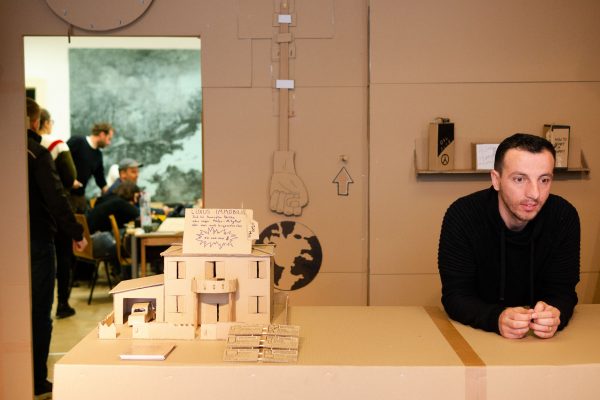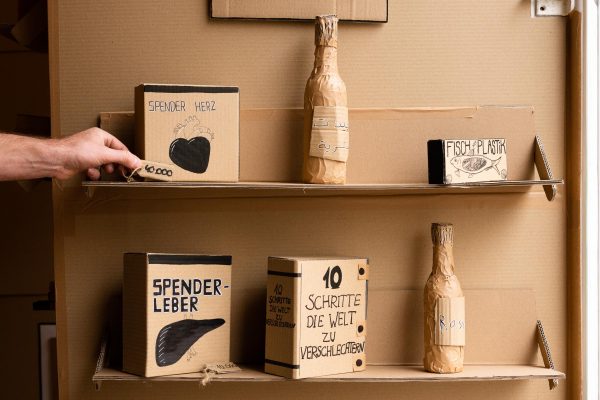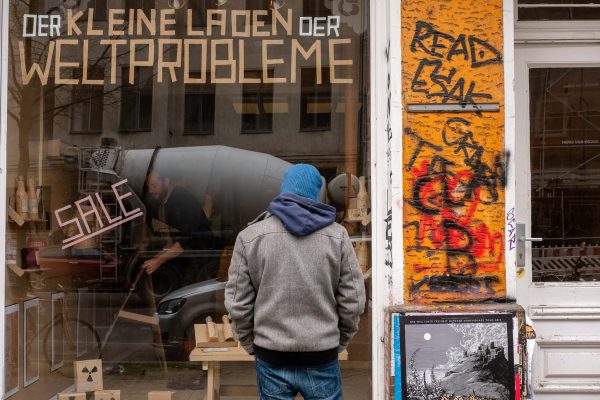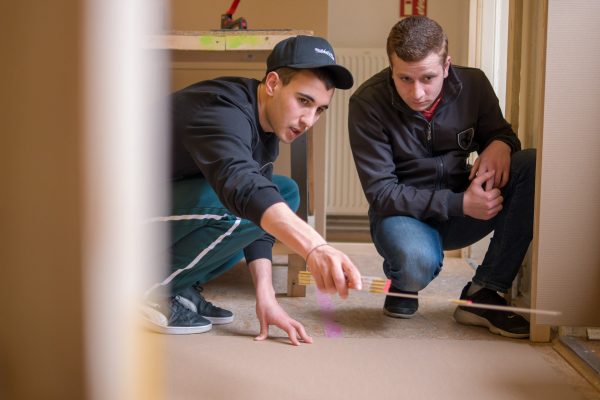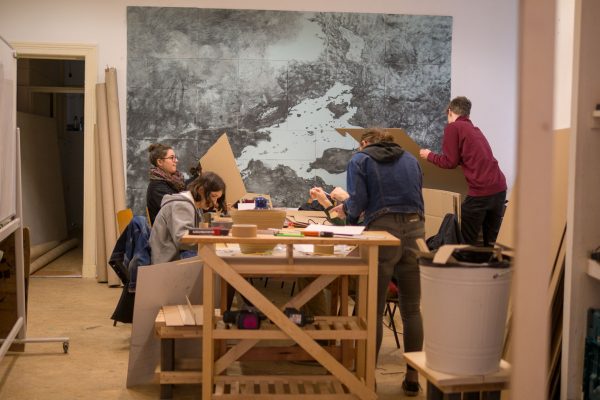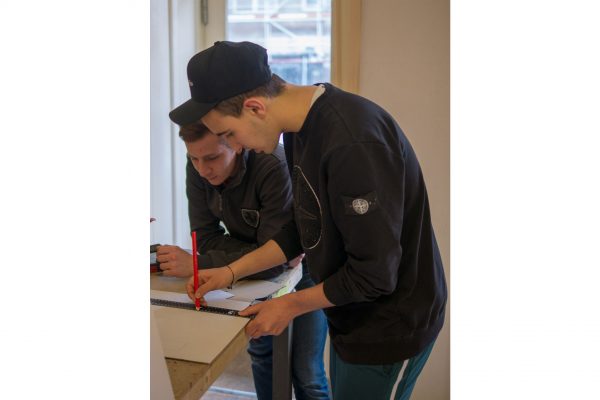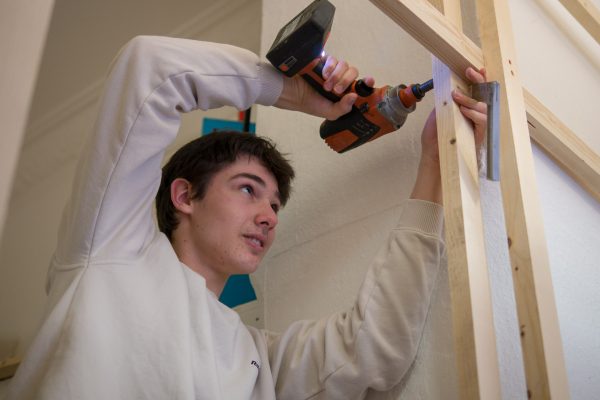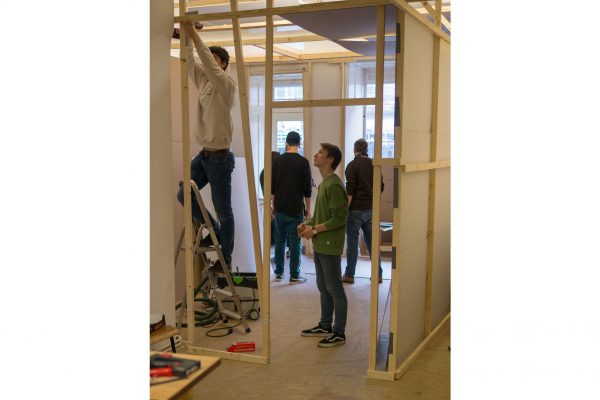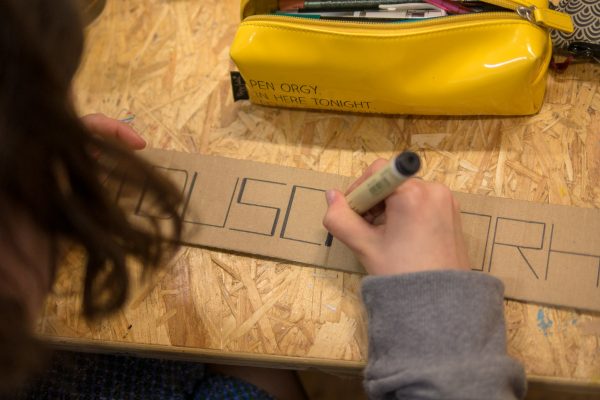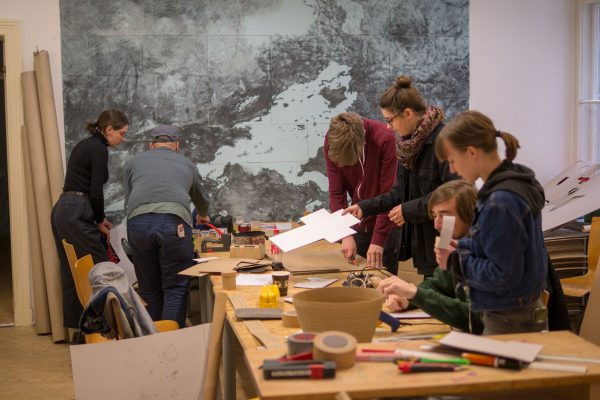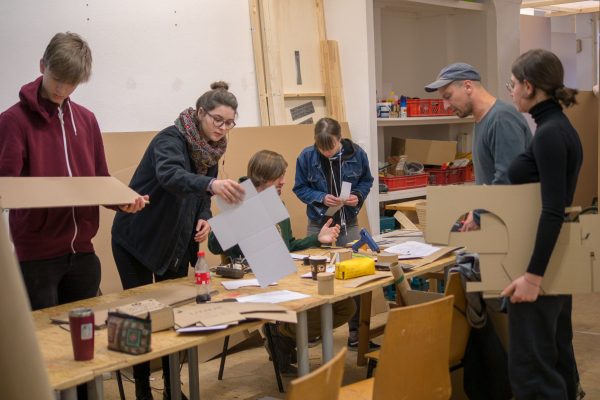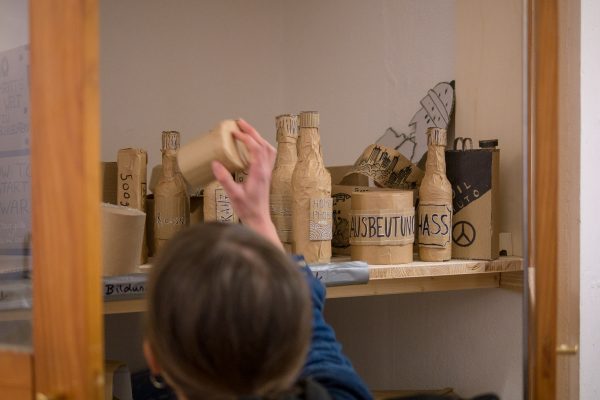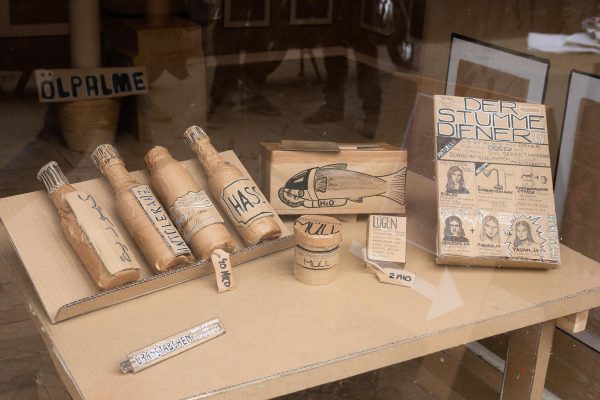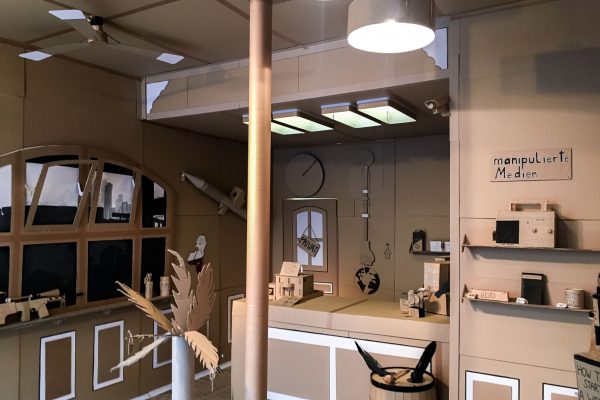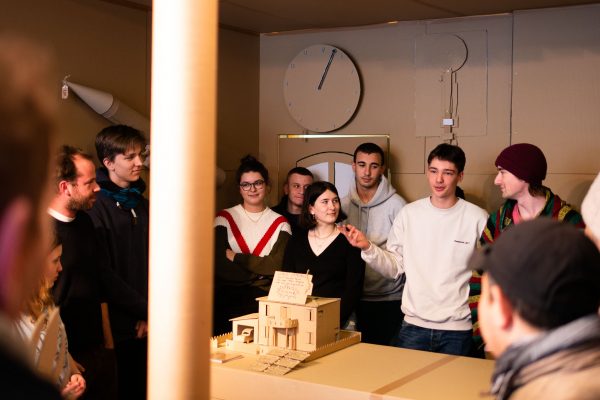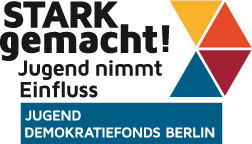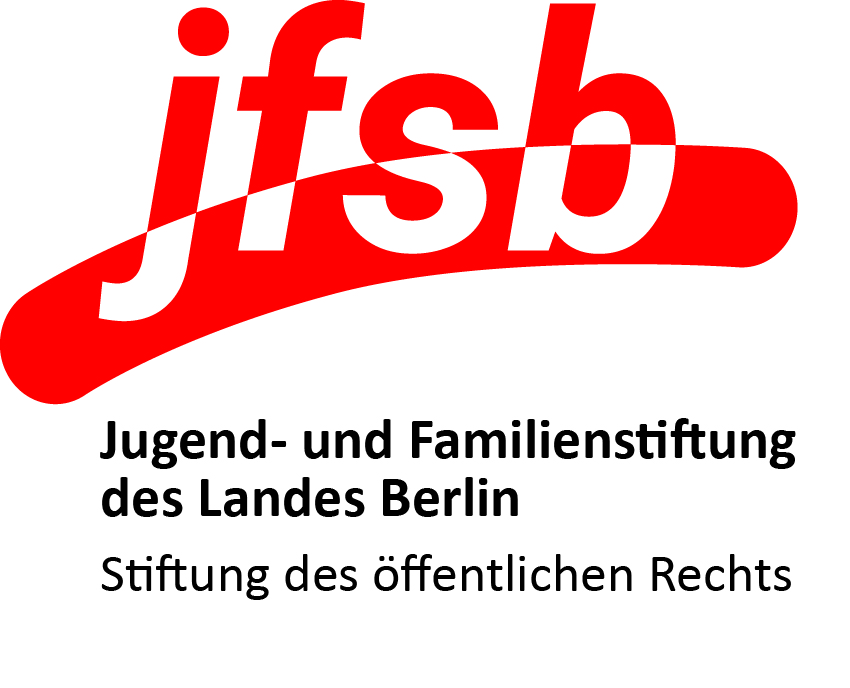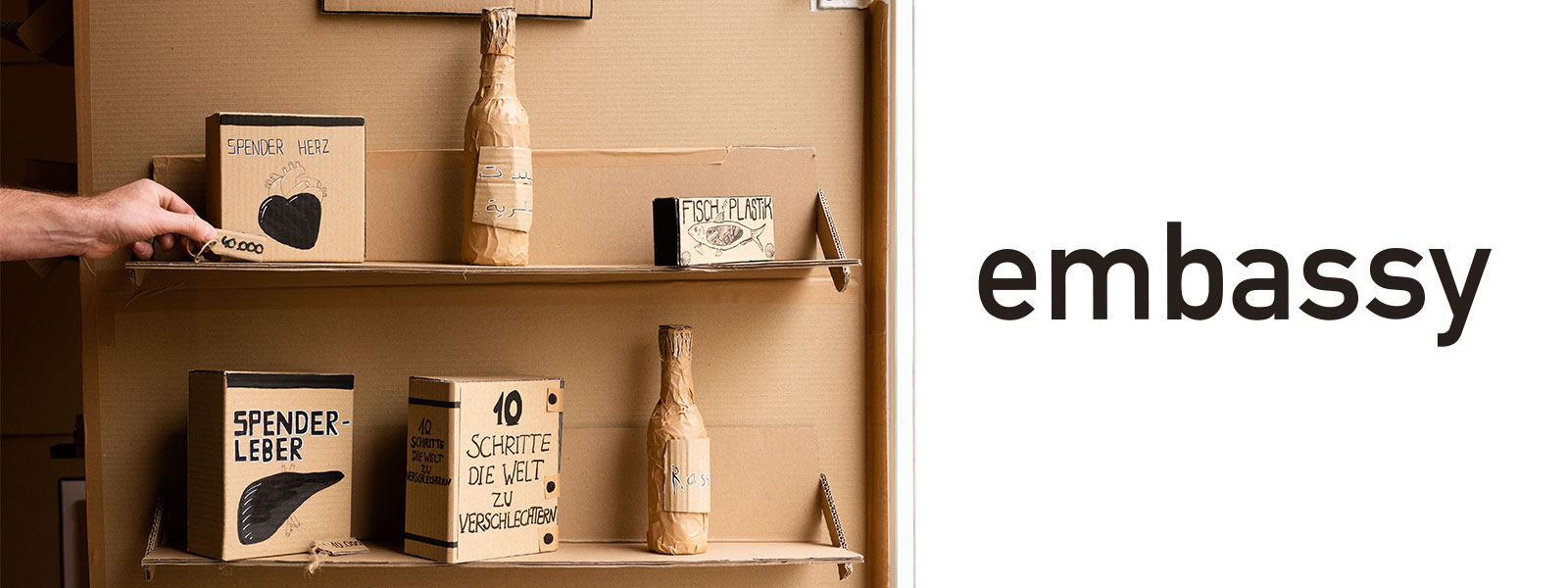
Good news
Young people try out living together in a fictitious foreign mission.
How can solidarity grow and democratic behaviour be tested? One answer lies in spatial experimentation, in the model – in creative facilities in which the new community can be built and worked on. Here it is easier to get to know each other, argue and negotiate rules.
Together with children and young people, artists develop lively spatial installations and scenic sequences that test an experimental embassy of our future „common land“. The participants from the Max Bill School and our Bildungsmanufaktur quickly realise that their utopia is hardly possible in this world at the moment. Confronted with the big and small problems of the world, they realise that something has to be done! In the dialogue, they decide on an ironic approach – very specific problem products are offered for sale.
Abstract problems can no longer be ignored when they cross your doorstep – for example, when global warming is a concrete object on your kitchen table. As a customer of our shop, you become an ambassador for a simple idea: we look the problems in the face and work together to find a responsible way of living together.
„Der kleine Laden der Weltprobleme“ celebrated its opening on 12 April 2019 and customers are thrilled! What the participants have designed and realised together is something to be proud of. It can be viewed for a week. The shop is an example of a democratic space in which everyone is invited and encouraged to engage with our present and future.
Artistic direction: Matze Görig & Metin Gürdal
Workshop in the shop with pupils from the Max Bill School and participants from our Bildungsmanufaktur. Photos: © Aris Kress-Kallidromitis / S27 Opening of the shop. Photos: © Luis Krummenacher / S27.
Another explorative field laboratory was set up in collaboration with the Heinrich Zille School: How do we imagine a new country, the „Zusammenland“, what does it look like, how do people live there and make decisions together? The children designed their own „Planet Zille“ on the COOP CAMPUS site. The aim was to model the pupils‘ visions for the growing Zusammenland.
In terms of methodology and didactics, the embassy team worked on combining political education and creative workshop formats. It was particularly exciting to see how the urban/spatial needs of children differ from those of young people. On the one hand, more imaginative places emerged, while on the other hand they emphasised the connections between their desired places and natural spaces: new places for meeting and making decisions should have an INSIDE and an OUTSIDE!
Pictures: Luis Krummenacher

Im Rahmen des Projektes »embassy« entsteht »Der kleine Laden der Weltprobleme«.
Frohe Botschaft
Jugendliche erproben das Zusammenleben in einer fiktiven Auslandsvertretung.
Wie kann Solidarität wachsen und demokratisches Handeln erprobt werden? Eine Antwort liegt im räumlichen Experiment, im Modell – in kreativen Anlagen, in denen am neuen Gemeinsamen gebaut und gewerkelt werden kann. Hier lässt es sich besser kennenlernen, argumentieren und Regeln aushandeln.
Künstler*innen entwickeln zusammen mit Kindern und Jugendlichen lebendige Rauminstallationen und szenische Sequenzen, die einen experimentellen Botschaftsbetrieb unseres zukünftigen »Zusammenlands« erproben. Schnell wird den Teilnehmer*innen von der Max-Bill-Schule und unserer Bildungsmanufaktur klar, dass ihr Utopia momentan auf dieser Welt kaum möglich ist. Konfrontiert mit den großen und kleinen Problemen der Welt, wird klar, dass etwas getan werden muss! Im Dialog entscheiden sie sich für eine ironische Herangehensweise – ganz spezifische Problemprodukte werden feilgeboten.
Abstrakte Problematiken können nicht mehr ausgeblendet werden, wenn sie die eigene Türschwelle übertreten – wenn z.B. die Klimaerwärmung als konkreter Gegenstand auf dem Küchentisch steht. Als Kunde unseres Ladens wird man Botschafter*in einer simplen Idee: Wir blicken den Problemen ins Gesicht und suchen gemeinsam nach einer verantwortungsbewussten Form des Zusammenlebens.
»Der kleine Laden der Weltprobleme« feiert seine Eröffnung am 12. April 2019 und die Kunden sind begeistert! Was die Teilnehmer*innen da gemeinsam konzipiert und umgesetzt haben, kann sich sehen lassen. Eine Woche lang ist er zu begutachten. Der Laden steht beispielhaft für einen demokratischen Raum, in dem alle eingeladen und gefordert sind, sich mit unserer Gegenwart und Zukunft auseinanderzusetzen.
Künstlerische Leitung: Matze Görig & Metin Gürdal
Workshop im Laden mit Schüler*innen der Max-Bill-Schule und Teilnehmer*innen unserer Bildungsmanufaktur. Fotos: © Aris Kress-Kallidromitis / S27. Eröffnung des Ladens. Fotos: © Luis Krummenacher / S27.
In Zusammenarbeit mit der Heinrich-Zille-Schule wurde ein weiteres exploratives Feldlabor eingerichtet: Wie stellen wir uns ein neues Land, das „Zusammenland“ vor, wie schaut es da aus, wie lebt man da und entscheidet zusammen? Die Kinder entwarfen ihren eigenen „Planet Zille“ auf dem Gelände des COOP CAMPUS. Das Ziel war es, den Visionen von Schüler*innen für das wachsende Zusammenland modellhaft Form zu geben.
Methodisch und didaktisch arbeitete das embassy-Team an der Verbindung von politischer Bildung und kreativen Workshopformaten. Spannend war vor allem zu sehen, wie sich die Stadt/Raum-Bedürfnisse der Kinder von denen der Jugendlichen unterscheiden. Einerseits zeichneten sich phantastischere Orte ab, die andererseits noch stärker auf die Verbindungen ihrer gewünschten Plätze zu Naturräumen hinweisen: neue Orte der Zusammenkunft und Entscheidung sollen ein DRINNEN und ein DRAUSSEN haben!

